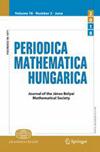算术级数上的除数之和
IF 0.5
3区 数学
Q3 MATHEMATICS
引用次数: 0
摘要
对于每一个 s\in {\mathbb {R}}\ 和 n\in {\mathbb {N}}\, 让 \(\sigma _s(n) = \sum _{d\mid n}d^s\).在本文中,我们将研究差分 \(\sigma _s(an+b)-\sigma _s(cn+d)\)中符号变化的次数,其中 a, b, c, d, s 是固定的,向量(a, b)和(c, d)在 \({\mathbb {Q}}\) 上是线性独立的,并且 n 贯穿所有正整数。我们还给出了几个例子,并提出了一些问题。本文章由计算机程序翻译,如有差异,请以英文原文为准。
Sums of divisors on arithmetic progressions
For each \(s\in {\mathbb {R}}\) and \(n\in {\mathbb {N}}\), let \(\sigma _s(n) = \sum _{d\mid n}d^s\). In this article, we study the number of sign changes in the difference \(\sigma _s(an+b)-\sigma _s(cn+d)\) where a, b, c, d, s are fixed, the vectors (a, b) and (c, d) are linearly independent over \({\mathbb {Q}}\), and n runs over all positive integers. We also give several examples and propose some problems.
求助全文
通过发布文献求助,成功后即可免费获取论文全文。
去求助
来源期刊
CiteScore
1.40
自引率
0.00%
发文量
67
审稿时长
>12 weeks
期刊介绍:
Periodica Mathematica Hungarica is devoted to publishing research articles in all areas of pure and applied mathematics as well as theoretical computer science. To be published in the Periodica, a paper must be correct, new, and significant. Very strong submissions (upon the consent of the author) will be redirected to Acta Mathematica Hungarica.
Periodica Mathematica Hungarica is the journal of the Hungarian Mathematical Society (János Bolyai Mathematical Society). The main profile of the journal is in pure mathematics, being open to applied mathematical papers with significant mathematical content.

 求助内容:
求助内容: 应助结果提醒方式:
应助结果提醒方式:


